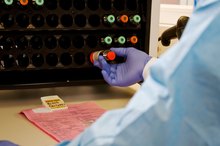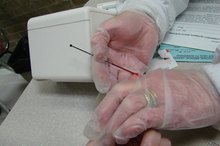Differences in a CMP and a BMP
The two metabolic tests that doctors commonly order are the CMP and the BMP. CMP is the medical abbreviation for Comprehensive Metabolic Profile and BMP is the abbreviation for Basic Metabolic Profile 12. The CMP is usually comprised of a group of 14 specific tests that tell about the current status of your kidneys, liver, and electrolyte and acid/base balance, as well as your blood sugar and blood proteins. The BMP only contains eight of the metabolic tests 12.
If you are experiencing serious medical symptoms, seek emergency treatment immediately.
The Comprehensive Metabolic Profile, CMP
The blood electrolytes measured are sodium, potassium, chloride and carbon dioxide. Imbalances in these tests indicate an abnormal acid/base balance in the blood. The next test in the profile is the test for glucose. Abnormal glucose levels are associated with diabetes. Blood urea nitrogen and creatinine are analyzed to indicate the health of the liver and kidneys. A blood calcium level is tested to look for bone and muscle health.
The CMP goes on to check levels of liver function by analyzing the blood bilirubin and liver enzyme tests. These enzymes are called AST, ALT and ALP. By checking the liver enzymes, a doctor can monitor drug therapy, hepatitis or other metabolic functions.
Two other blood tests included in the CMP, but not in the BMP, are the total protein and albumin levels. Abnormalities in the protein levels can indicate a digestion or absorption problem in the digestive tract.
- The blood electrolytes measured are sodium, potassium, chloride and carbon dioxide.
- Two other blood tests included in the CMP, but not in the BMP, are the total protein and albumin levels.
The Basic Metabolic Profile, BMP
What Is a High GGT Level?
Learn More
Both CMP's and BMP's are done on fasting blood specimens for best results. The BMP is a quick and easy monitor for the acid/base balance of the blood, for a screening test for diabetes and a screening test for kidney and liver function. It is less expensive for the patient, yet still indicates the current state of metabolic normality or abnormality. The BMP will generally be included in a yearly physical exam.
Doctors base the decision to order a BMP instead of a CMP depending on several factors including general state of health, drug therapy and any symptoms a patient has.
- Both CMP's and BMP's are done on fasting blood specimens for best results.
- The BMP is a quick and easy monitor for the acid/base balance of the blood, for a screening test for diabetes and a screening test for kidney and liver function.
Comparing the Differences of the CMP and BMP
On one hand the CMP is a more thorough blood test, but it is more expensive and takes a bit longer to run. The BMP is a common screening test done on an emergency basis, as well as a standard order, for quickly determining the present state of overall health. Both are standard chemistry lab tests and require the same amount of blood sample. Doctors usually order the BMP first and add the liver function testing if necessary.
- On one hand the CMP is a more thorough blood test, but it is more expensive and takes a bit longer to run.
Related Articles
References
- Lab Tests Online: Comprehensive Metabolic Profile
- Lab Tests Online: Basic Metabolic Profile
- American Association for Clinical Chemistry. Comprehensive metabolic panel.
- American College of Gastroenterology. Medications and the liver. Updated December 2012.
- National Kidney Foundation. Which drugs are harmful to your kidneys?
- National Institutes for Health. MedlinePlus. Albumin blood test.
- National Institutes for Health. MedlinePlus. Potassium blood test.
- National Institutes for Health. MedlinePlus. Medical encyclopedia: Comprehensive metabolic panel. Updated January 26, 2019.
- National Institutes for Health. MedlinePlus. Medical tests: Comprehensive metabolic panel.
Writer Bio
Lela A. Cargill, M.T. (ASCP), B.A., is a certified medical laboratory scientist with more than 30 years of experience. Her specialty is transfusion medicine. Her degree at Sam Houston State University includes emphasis in journalism and photography. She writes for Examiner.com, HubPages, and eHow. Also known as Austinstar, she writes articles on art, travel and the health sciences.








